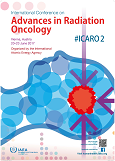Speakers
Layth Yahya Mula-Hussain
(Zhianawa Cancer Center - Kurdistan Board for Medical Specialties)
Shwan Ali
(Zhianawa Cancer Center)
Description
Background:
Intensity Modulated Radiation Therapy (IMRT) is one of the modern radiotherapy (RT) techniques after the 3-Dimentional Conformal Radiation Therapy (3D-CRT) that became available early 2000s in the developed countries. Iraq, a war-torn country since 1980s, is a developing country where many of the civil services had been affected, including the health sector in general and the cancer care in particular. In spite of all the challenges, IMRT was started in this nation in April 2013 and it is still running. Although the fact that this report is primitive on its type, but the authors thought that it might be of interest to the RT community in the developing countries.
Methods:
Descriptive report of the patients who received IMRT in Zhianawa Cancer Center (ZCC) in Sulaymaniyah city, the only IMRT facility in Iraq since 2013.
Results:
A total number of 38 patients was treated with IMRT during the period of April 2013 through June 2016, with an average of one patient per month. 97% of the patients were planned for curative intent; 40% are from other Iraqi governorates and 32% were females; Age range was 8-76 year (mean of 46.3 year old) and 24% are in the pediatric age range (8-17 year). 90% are with head and neck cancers (mainly nasopharyngeal carcinoma) with just two patients with prostate cancer, one with chest wall sarcoma and one with brain metastasis for palliative re-irradiation. Among those in follow-up (31 in total, with a mean follow-up period of 2 years), 22 patients are in complete remission (71%).
Conclusions:
In spite of the great shortage in RT machines, IMRT successfully launched in Iraq in April 2013. A total of 38 patients got this service in ZCC for free, from different Iraqi cities. This low number of patients is due to the huge work-load of patients and very long waiting time in ZCC and the fact that IMRT is more time-consuming in comparison with the 3D-CRT service, the reason that led us to be very careful in selecting those who are in absolute need to IMRT. Most of our patients are of advanced head and neck cancers. Further reports will be required to fully understand the outcomes of this new service in Iraq. Attention to increase the machines in this war-torn country is important to expand the IMRT service to other centers.
| Institution | Radiation Oncology Program, Zhianawa Cancer Center – Kurdistan Board for Medical Specialties, Sulaymaniyah, Kurdistan, Iraq. |
|---|---|
| Country | Iraq |
Authors
Kamaran A. Mohammad
(Zhianawa Cancer Center)
Layth Yahya Mula-Hussain
(Zhianawa Cancer Center - Kurdistan Board for Medical Specialties)
Co-authors
Ali H. Gendari
(Zhianawa Cancer Center)
Bamo M. Muhsin
(Zhianawa Cancer Center)
Hawbir O. Ghafour
(Zhianawa Cancer Center)
Hunar Hassan
(Zhianawa Cancer Center)
Jalil S. Ali
(Zhianawa Cancer Center)
Sazgar Majid
(Zhianawa Cancer Center)
Shwan Ali
(Zhianawa Cancer Center)
Zarean Saeed

